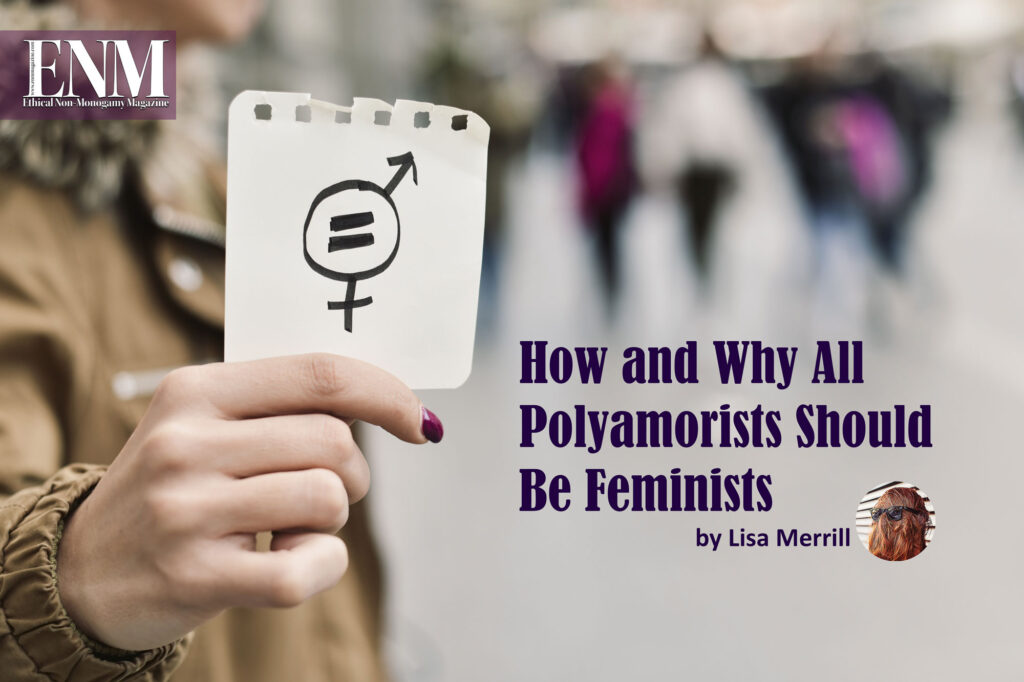
Some people think polyamory is always sexist — they can’t see any options other than monogamy, a woman being owned and shared as a possession between several men, or a lone man with a harem of women to service him. But when you think about it, why would those be the only options? If you can picture a lone man with a harem of women to service him, can’t you also picture a lone woman being treated equally — if not better — in a relationship with more than one man? Likewise, when women outnumber men in a relationship they need not be treated as a harem, and could even be treated in a superior way (as in the possession-owning model discussed above) or in an equal way. Equality of rights within polyamory need not be connected to equality of numbers — for example, a woman in a poly relationship with several men may be in love with and sincerely loved by each one of them, and women in a poly relationship with one man may each sincerely love and be loved by him, with no one seeing anyone as a possession or harem servant. Thus, while some feminists may say that polyamory is inherently anti-feminist, I disagree, and I encourage polyamorists to be feminists not only because they are welcomed by some feminists (such as myself) but because I think everyone should be a feminist, and because I think polyamorists in particular can benefit from feminism in some important ways.
The first of these ways is simply due to the fact that feminism (among other things) seeks to end slut-shaming, which often affects women involved in polyamory (in addition to other women). Some may say that this is due to an incorrect perception that a woman who is involved in polyamory must be so in order to have a lot of sex and/or have it with a lot of different partners. While this is not true in regard to all polyamorous women, it is true for some of them, and in any case it is nothing anyone of any gender ought to be shamed for.
The second way that polyamorists can benefit from feminism is that feminism generally seeks to put an end to the idea that women belong to men. However, just because someone is monogamous, doesn’t necessarily mean that they must reject the monogamy in order to reject the idea that women belong to men. If a woman wishes to be monogamous and her partner agrees to be monogamous in return, that in itself is not treating the woman like property if her partner is under the same restriction, and she has happily and freely agreed to it. Objections to polyamory are often rooted in the unfortunate idea that a woman should be sexually faithful specifically as a sign that she belongs to the man she has sex with. Which is also often accompanied by other restrictions (she’s “not allowed” to go out with other men) and often by the idea that a woman’s infidelity is more unforgivable than a man’s infidelity. A man’s infidelity is much more acceptable because “men have needs,” and the idea that men are perceived to be less likely to “belong” to a woman than the other way around. Ultimately, these ideas are sexist, as they put the greater burden on the woman and see her as the man’s property while he is much more free, and is seen to “need” sex much more than she does — an ideal that feminism is rightfully opposed to — and this is also a way in which feminism supports polyamory in which many people who practice polyamory reject this sexist double standard.
Now, as for how polyamorists should be feminists: First of all, fighting sexism in our own community, and in media representations of our community is even more important in the polyamory community. The sexist notions that a woman in a relationship with more than one man must be being exploited or treated as a possession, or slut shamed, and the idea that a man in a relationship with more than one woman must be being catered to by a variety of women that he “owns,” must be opposed in order to empower and ensure the equality of women in our community.
Feminism in general should be supported, but most of all where it intersects with polyamory, we must realize how much that the rights of women to make their own choices, which is one of the most important parts of feminism, goes hand in hand with polyamory. Not only because women are about half of all polyamorists, but because when women’s choices get restricted, one of the first things to go is their sexual choices. Think of the notoriously anti-feminist 1950s and how unthinkable and oppressed polyamory was back then. The repression of feminism almost always means the repression of women’s sexuality, among other things, and that cannot happen without repression of women who engage in polyamory. Nor can women participate in polyamory equally if they cannot participate in society equally. How can polyamorous groups that are made up of a large percentage of women thrive if women are denied equal opportunities in our society? How can women in polyamorous groups be treated as equal members within the group if they are not treated as equal members within society in general, if they are denied such things like the right to choose whether or not to be pregnant, equal pay so that they can have economic independence if they need to leave the relationship, and so on?
So poly people — including myself — should see feminism as an essential issue to support for our own sakes, whether or not we are women, because the fortunes of feminism are the fortunes of us all.




Comments are closed